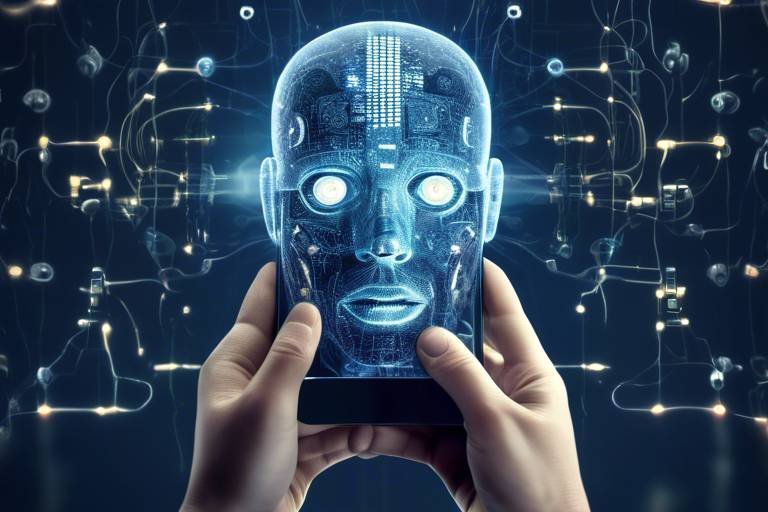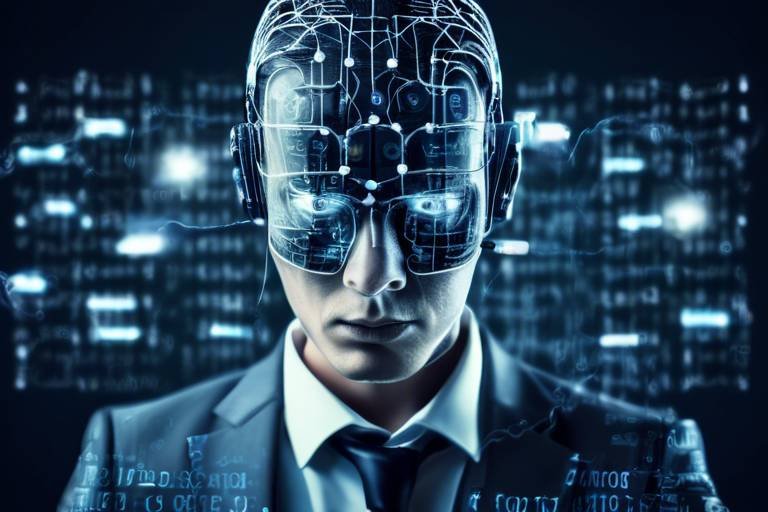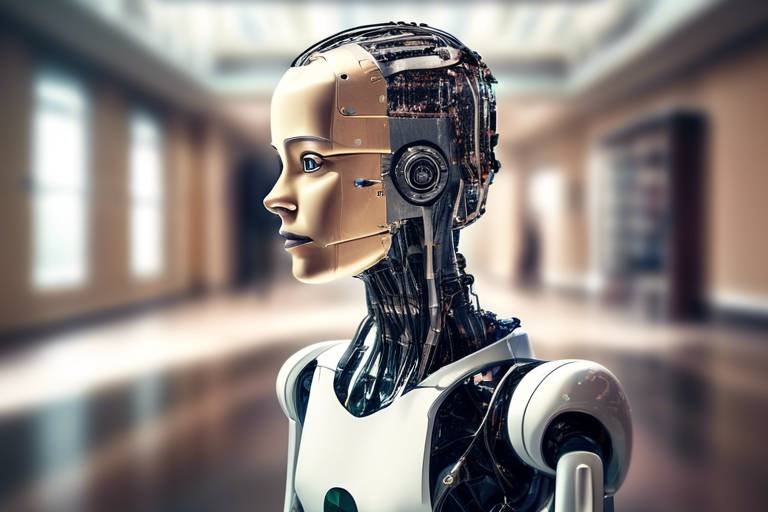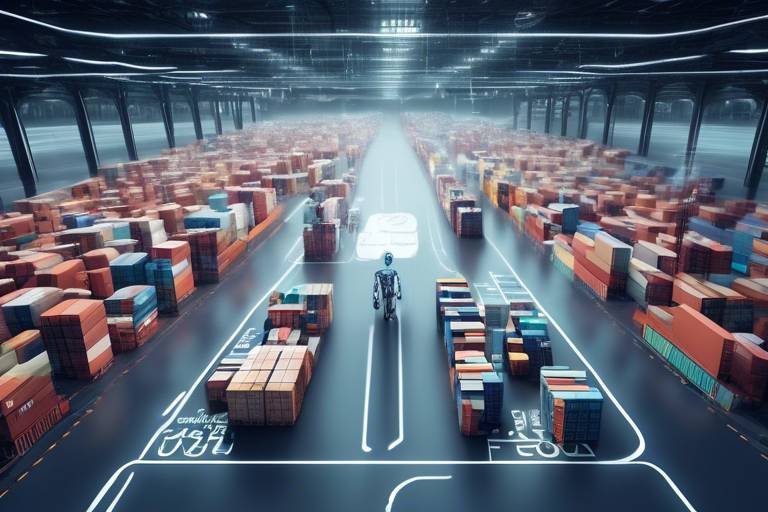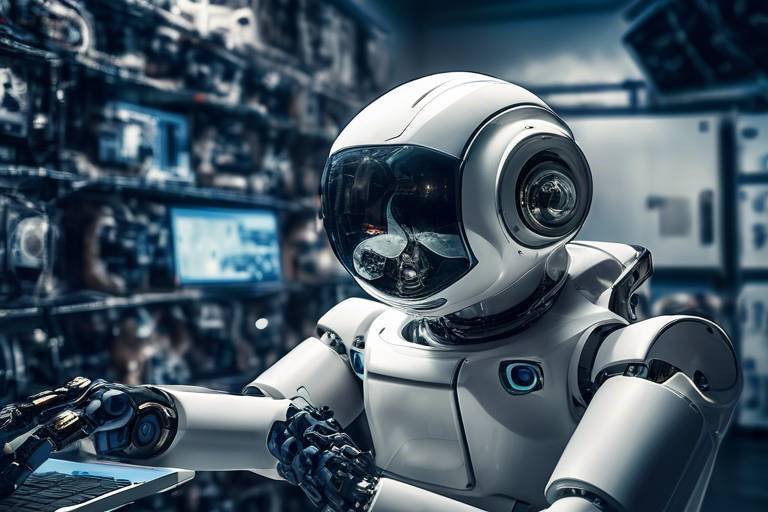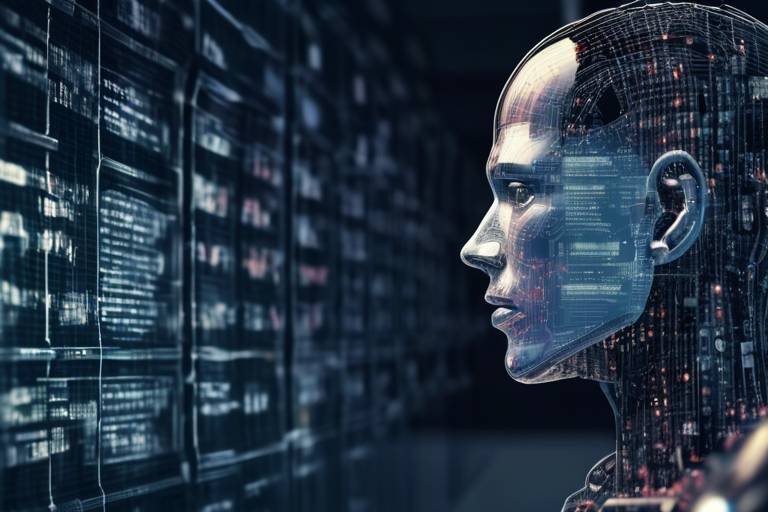Future of Blockchain Technology with AI: Innovations & Predictions
As we stand on the brink of a technological revolution, the fusion of blockchain technology and artificial intelligence (AI) is set to reshape industries in ways we've only begun to imagine. This intersection is not merely a trend; it represents a paradigm shift that promises to enhance efficiency, security, and transparency across various sectors. Think of it as the meeting of two powerful forces: blockchain, with its ability to create immutable ledgers, and AI, with its capacity to analyze vast amounts of data and derive actionable insights. Together, they hold the potential to create smarter systems that can adapt and respond to challenges in real-time.
Imagine a world where financial transactions are not only secure but also instantaneous, where supply chains are optimized through predictive analytics, and where healthcare systems can make data-driven decisions to improve patient outcomes. These innovations are not just possibilities; they are on the horizon. By integrating AI with blockchain, we can unlock new levels of operational efficiency and data integrity. This article will explore these innovations, the challenges that lie ahead, and the predictions from industry experts on how this synergy will evolve.
In the following sections, we will delve into the fundamental principles of blockchain technology, the transformative role of AI within this framework, and the challenges that must be overcome to fully realize this potential. Ultimately, our journey will lead us to predictions that outline a future where blockchain and AI not only coexist but thrive together, driving significant advancements in fields such as finance, healthcare, and supply chain management.
At its core, blockchain technology functions as a decentralized ledger that records transactions across many computers in such a way that the registered transactions cannot be altered retroactively. This ensures a level of transparency and security that is unprecedented in traditional systems. Each block in the chain contains a number of transactions, and every time a new transaction occurs on the blockchain, a record of that transaction is added to every participant's ledger. This decentralized nature of blockchain eliminates the need for intermediaries, reducing costs and increasing efficiency.
Artificial intelligence plays a crucial role in enhancing blockchain technology. By leveraging AI, organizations can improve data analysis, enhance security measures, and streamline transaction processes. The integration of AI with blockchain is akin to adding a highly intelligent brain to a robust body; it not only improves functionality but also enables smarter decision-making. This section will explore the various ways AI can enhance blockchain, from automating smart contracts to utilizing predictive analytics for better forecasting.
One of the most exciting applications of AI in blockchain is the automation of smart contracts. These self-executing contracts with the terms of the agreement directly written into code can significantly reduce human error and increase trust between parties. Imagine a scenario where a contract automatically executes payment once all conditions are met, without the need for human intervention. This not only speeds up transactions but also minimizes disputes.
Integrating predictive analytics into blockchain systems allows organizations to analyze historical data patterns and trends, leading to better decision-making. For instance, businesses can forecast demand more accurately, optimizing inventory management and reducing waste. This capability can revolutionize supply chain management, ensuring that products are available when and where they are needed.
AI algorithms can bolster blockchain security by identifying vulnerabilities, detecting fraud, and responding to threats in real-time. With cyber threats becoming increasingly sophisticated, the combination of AI and blockchain can provide a robust defense mechanism. By continuously learning from new data, AI can adapt and evolve, making it harder for malicious actors to exploit weaknesses.
Managing large volumes of data on blockchain networks is another area where AI shines. It ensures data integrity and facilitates efficient data retrieval and analysis. In a world where data is the new oil, having a system that can efficiently manage and analyze this data is invaluable. AI can help in filtering out noise and highlighting critical information, allowing organizations to make informed decisions quickly.
Despite the promising potential of combining AI with blockchain, several challenges must be addressed. Issues such as scalability, regulatory hurdles, and the need for interoperability can hinder the widespread adoption of these technologies. Understanding these challenges is crucial for stakeholders looking to navigate this complex landscape.
One significant challenge is scalability. Implementing AI algorithms on blockchain networks can lead to performance bottlenecks, limiting the speed and efficiency of transactions. As more users join the network, maintaining performance becomes increasingly difficult, necessitating innovative solutions to enhance scalability.
Additionally, the integration of AI and blockchain raises regulatory and ethical concerns. Issues surrounding data privacy and the need for clear governance frameworks are paramount. As these technologies evolve, so too must the regulations that govern them, ensuring that they are used responsibly and ethically.
Looking ahead, experts predict that the synergy between blockchain and AI will significantly impact various industries. In finance, for instance, transactions will become more secure, costs will decrease, and customer experiences will improve through personalized services. In healthcare, AI-driven analytics can lead to better patient outcomes, while in supply chain management, transparency and efficiency will be enhanced.
The financial services sector stands to gain immensely from the integration of blockchain and AI. With enhanced transaction security and reduced operational costs, businesses can offer personalized services that cater to individual customer needs. This transformation could lead to a more inclusive financial ecosystem where access to services is democratized.
In supply chain management, the combination of blockchain and AI can drive innovations that enhance transparency and traceability. By providing real-time data on product movements, companies can optimize logistics and inventory management, ultimately improving efficiency and reducing costs.
- What is blockchain technology? Blockchain is a decentralized digital ledger that records transactions across multiple computers, ensuring security and transparency.
- How does AI enhance blockchain? AI improves data analysis, automates processes, and enhances security measures within blockchain systems.
- What are smart contracts? Smart contracts are self-executing contracts with terms directly written into code, reducing the need for intermediaries.
- What challenges exist in integrating AI and blockchain? Key challenges include scalability issues, regulatory hurdles, and the need for interoperability.

Understanding Blockchain Technology
Blockchain technology is often described as a revolutionary approach to data management and transaction processing. At its core, it operates as a decentralized ledger, meaning that it allows multiple parties to access and verify transactions without a central authority. Imagine a digital notebook that everyone can see and write in, but no one can erase or alter past entries. This transparency not only fosters trust among users but also enhances security, making it nearly impossible for malicious actors to manipulate the data.
One of the fundamental principles of blockchain is its structure. Each block in the chain contains a list of transactions, a timestamp, and a unique cryptographic hash of the previous block. This creates a chain of blocks that is inherently secure. If someone tries to alter a block, the hash changes, breaking the chain and alerting the network to the tampering. This mechanism is what makes blockchain so appealing for various sectors, including finance, healthcare, and supply chain management.
Moreover, blockchain technology promotes transparency and immutability. Transactions are recorded in a way that is visible to all participants in the network, which means that everyone can verify the authenticity of the data. This feature is particularly crucial in industries where trust is paramount. For instance, in the financial sector, blockchain can help reduce fraud by providing a clear, unalterable record of all transactions.
Another significant aspect of blockchain is its ability to operate without intermediaries. Traditionally, transactions require a third party, such as a bank or payment processor, to facilitate the exchange. Blockchain eliminates this need, allowing users to transact directly with one another. This not only reduces costs but also speeds up the process, making transactions more efficient.
In summary, blockchain technology is more than just a buzzword; it represents a paradigm shift in how we think about data and transactions. Its decentralized nature, combined with transparency and security, makes it a powerful tool for innovation across various industries. As we continue to explore its potential, it is essential to understand the fundamental principles that underpin this technology, as they will shape its future applications and integrations, especially with emerging technologies like artificial intelligence.
- What is blockchain technology? Blockchain is a decentralized digital ledger that records transactions across multiple computers securely and transparently.
- How does blockchain ensure security? Each block contains a unique cryptographic hash of the previous block, making it nearly impossible to alter past transactions without detection.
- What industries can benefit from blockchain? Industries such as finance, healthcare, supply chain management, and more can leverage blockchain for improved transparency and security.
- Can blockchain operate without intermediaries? Yes, blockchain allows direct transactions between parties, eliminating the need for third-party intermediaries.

The Role of AI in Blockchain
The marriage of artificial intelligence (AI) and blockchain technology is nothing short of revolutionary. As we dive deeper into this synergy, it becomes clear that AI isn't just a buzzword; it's a game-changer for how blockchain operates and evolves. Imagine a world where transactions are not only secure but also smart—where systems learn from past behaviors to enhance future operations. This is the promise of integrating AI into the blockchain ecosystem.
At its core, AI enhances blockchain technology by improving several crucial processes. For instance, data analysis becomes significantly more efficient when AI algorithms sift through massive amounts of blockchain data. They can identify patterns that humans might overlook, allowing for better decision-making. Additionally, AI can enhance security measures, ensuring that the integrity of the blockchain remains intact even when faced with sophisticated cyber threats. Think of it as having a vigilant guard who not only watches over the premises but also learns from each encounter to improve their defensive strategies.
One of the most exciting applications of AI in blockchain is the automation of smart contracts. These self-executing contracts are coded to execute transactions automatically when certain conditions are met. By integrating AI, these contracts can become even more sophisticated. For example, AI can analyze real-time data to determine when to trigger a contract, reducing human error and increasing trust between parties. Imagine a real estate transaction where the contract automatically executes once the buyer's payment is verified, all without the need for a middleman. This not only speeds up the process but also minimizes disputes.
Another fascinating aspect is the use of predictive analytics. By leveraging AI, blockchain systems can analyze historical data patterns to make informed predictions about future trends. For instance, in the financial sector, AI can forecast market movements based on previous transaction data stored on the blockchain. This capability allows businesses to make proactive decisions rather than reactive ones, which is crucial in today’s fast-paced environment.
When it comes to security, AI plays a pivotal role in identifying vulnerabilities within blockchain networks. Traditional security measures can sometimes be reactive, addressing threats only after they have occurred. However, AI can proactively monitor transactions and user activities, detecting anomalies in real-time. This means that potential fraud can be thwarted before it even occurs, safeguarding assets and building trust among users. Imagine a system that learns from each transaction and adapts its security protocols accordingly—this is the future we are heading towards.
Lastly, let's talk about data management. Blockchain networks generate vast amounts of data, and managing this data efficiently is crucial. AI can facilitate the retrieval and analysis of large data sets, ensuring that the information remains accurate and accessible. By utilizing AI, organizations can ensure that their data integrity is maintained, allowing for seamless operations across various sectors. This is akin to having a highly organized librarian who not only keeps track of every book but also knows exactly where to find the information you need, even in a sea of thousands of volumes.
In conclusion, the role of AI in blockchain is not just about enhancing existing processes; it's about transforming the entire landscape. By automating tasks, improving security, and providing valuable insights through predictive analytics, AI is set to redefine how we perceive and utilize blockchain technology. As we look forward, the possibilities are limitless, and the future of this integration is undoubtedly bright.
- What is the main benefit of integrating AI with blockchain? The primary benefit lies in enhanced efficiency, security, and decision-making capabilities, allowing for smarter systems.
- How do smart contracts work with AI? AI can automate the execution of smart contracts based on real-time data, reducing errors and increasing trust.
- Can AI improve blockchain security? Yes, AI can proactively identify vulnerabilities and detect fraudulent activities in real-time, enhancing overall security.
- What industries will benefit most from AI and blockchain integration? Industries like finance, healthcare, and supply chain management are expected to see significant advancements.

Smart Contracts and Automation
Smart contracts are like the digital equivalent of a vending machine. You put in your money (or data), and the machine automatically delivers the product (or executes the agreement) without needing a middleman. This is where the magic of automation comes into play, powered by the synergy of blockchain technology and artificial intelligence (AI). Imagine a world where contracts execute themselves, without any human intervention—this is not just a dream but a rapidly approaching reality.
At its core, a smart contract is a self-executing contract with the terms of the agreement directly written into code. When certain conditions are met, the contract automatically executes, ensuring that all parties are held accountable. This eliminates the need for trust in a third party, reducing the risk of fraud and human error. With AI stepping into the picture, the potential for these contracts expands exponentially. AI can analyze vast amounts of data, making it possible to create more sophisticated and adaptable contracts that can respond to changing conditions in real-time.
For instance, consider a scenario in the real estate market. A smart contract could automate the entire process of buying a home. When a buyer makes a payment, the contract could automatically transfer ownership, update the title, and even notify the local authorities—all without needing a lawyer or real estate agent to oversee the transaction. This not only speeds up the process but also significantly reduces costs. In addition, AI can assess market conditions and adjust the terms of the contract accordingly, ensuring that all parties are getting a fair deal.
The implications of this automation are vast and varied. Here are a few key benefits:
- Increased Efficiency: By automating the execution of contracts, businesses can save time and resources that would otherwise be spent on manual processes.
- Enhanced Trust: With blockchain's transparent nature, all parties can see the terms and status of the contract, fostering trust among participants.
- Cost Reduction: Eliminating intermediaries means lower fees, making transactions more affordable for everyone involved.
However, it's essential to acknowledge that while smart contracts offer incredible potential, they also come with challenges. For instance, the code must be flawless; a single bug could lead to unintended consequences. Moreover, legal recognition of smart contracts varies by jurisdiction, which could complicate their widespread adoption.
In conclusion, the combination of smart contracts and AI represents a revolutionary leap towards a more automated and efficient future. As we continue to explore this fusion, we can expect to see transformative changes across various industries, from finance to real estate, ultimately leading to a more streamlined and trustworthy way of conducting business.
- What are smart contracts? Smart contracts are self-executing contracts with the terms of the agreement directly written into code that automatically execute when conditions are met.
- How does AI enhance smart contracts? AI improves smart contracts by enabling them to analyze data, adapt to changing conditions, and automate complex processes, reducing the need for human intervention.
- What industries can benefit from smart contracts? Industries such as real estate, finance, supply chain management, and healthcare can significantly benefit from the efficiency and transparency offered by smart contracts.

Predictive Analytics in Blockchain
Predictive analytics is like having a crystal ball for data, allowing businesses to foresee trends and make informed decisions based on historical data. In the context of blockchain technology, this innovative approach is revolutionizing how organizations operate. By analyzing vast amounts of data stored on decentralized ledgers, predictive analytics can uncover patterns that were previously hidden, enabling companies to anticipate future outcomes and optimize their strategies.
Imagine a supply chain where each transaction is recorded on a blockchain. With predictive analytics, companies can analyze past delivery times, inventory levels, and demand fluctuations to forecast future needs. This not only enhances operational efficiency but also reduces costs associated with overstocking or stockouts. The synergy between predictive analytics and blockchain creates a powerful tool for businesses, providing them with the agility to adapt to changing market conditions.
One of the most compelling aspects of integrating predictive analytics with blockchain is the ability to enhance decision-making. For instance, in the financial sector, banks can utilize predictive models to assess credit risk more accurately by analyzing historical transaction data. This leads to better lending decisions and lower default rates. Moreover, the transparency of blockchain ensures that the data used for predictions is trustworthy and tamper-proof, further strengthening the reliability of the insights generated.
However, it's essential to recognize that the implementation of predictive analytics in blockchain is not without challenges. Organizations must ensure that they have the right infrastructure in place to handle large datasets. Additionally, the algorithms used for predictive modeling need to be robust and adaptable to the dynamic nature of blockchain data.
In conclusion, the fusion of predictive analytics and blockchain technology is paving the way for smarter, data-driven decision-making across various industries. As more organizations begin to recognize the potential of this combination, we can expect to see significant advancements that will redefine how businesses operate in the future. The journey is just beginning, and the possibilities are truly exciting!
- What is predictive analytics? Predictive analytics involves using statistical techniques and algorithms to analyze historical data and predict future outcomes.
- How does blockchain enhance predictive analytics? Blockchain provides a secure and transparent platform for storing data, ensuring that the information used for predictive analytics is accurate and tamper-proof.
- What industries can benefit from predictive analytics in blockchain? Industries such as finance, supply chain management, healthcare, and retail can greatly benefit from the insights gained through predictive analytics applied to blockchain data.
- Are there challenges in implementing predictive analytics in blockchain? Yes, challenges include the need for robust infrastructure, the complexity of algorithms, and ensuring data quality and integrity.

Enhancing Security Measures
In the digital age, where data breaches and cyber threats loom large, the integration of artificial intelligence (AI) with blockchain technology offers a robust solution to enhance security measures across various sectors. Blockchain, with its decentralized and immutable nature, provides a secure foundation for transactions. However, when layered with AI, it transforms into a fortress capable of defending against sophisticated attacks.
One of the primary ways AI enhances security in blockchain is through the use of advanced algorithms that can identify vulnerabilities in real-time. These algorithms analyze patterns and anomalies in transaction data, flagging suspicious activities before they escalate into significant threats. Imagine having a vigilant security guard who never sleeps—this is what AI brings to the table, constantly monitoring and learning from the data flowing through the blockchain.
Moreover, AI can significantly improve fraud detection mechanisms. Traditional methods often rely on static rules that can be easily bypassed by clever cybercriminals. In contrast, AI employs machine learning techniques that adapt and evolve, learning from new threats as they emerge. This dynamic approach not only increases the likelihood of detecting fraud but also reduces the number of false positives, ensuring that legitimate transactions proceed without unnecessary delays.
Additionally, AI can enhance the encryption and authentication processes within blockchain systems. By utilizing biometric data or behavioral analytics, AI can create a more secure method of verifying identities. For instance, consider a scenario where a user’s access is granted not just by a password but by analyzing their unique patterns of behavior—like how they type or navigate through an application. This multi-faceted approach to security not only fortifies the system but also adds layers of complexity that are difficult for attackers to penetrate.
To illustrate the impact of AI on blockchain security, let’s look at a few key benefits:
- Real-time threat detection: AI continuously monitors blockchain transactions, identifying and mitigating threats as they arise.
- Adaptive fraud prevention: Machine learning algorithms evolve with new data, improving the accuracy of fraud detection.
- Enhanced user authentication: AI can utilize biometric data for more secure identity verification.
As we move forward, the collaboration between AI and blockchain will likely yield even more sophisticated security measures. The potential for creating self-healing systems—where AI can autonomously respond to threats and repair vulnerabilities—could redefine how we perceive security in digital transactions. The future paints a picture of resilience, where blockchain not only serves as a ledger but also as a secure vault, safeguarded by the intelligence of AI.
In conclusion, the fusion of AI and blockchain is not just a technological advancement; it is a paradigm shift in how we approach security. As industries continue to adopt these technologies, the emphasis on enhanced security measures will be paramount, ensuring that trust and integrity remain at the forefront of digital interactions.
- How does AI improve blockchain security?
AI enhances blockchain security by analyzing transaction patterns, detecting anomalies, and adapting to new threats in real-time. - Can AI prevent all types of cyber attacks on blockchain?
While AI significantly improves security, no system can guarantee complete protection against all cyber threats. Continuous updates and monitoring are essential. - What role does machine learning play in blockchain security?
Machine learning helps in identifying fraudulent activities by learning from historical data and adapting to new patterns, improving the accuracy of fraud detection.

Data Management and Integrity
In the digital age, where data is often referred to as the new oil, managing it effectively is crucial for any organization. Data management within blockchain networks presents unique opportunities and challenges, particularly when combined with the power of artificial intelligence. The integration of AI into blockchain technology not only enhances data management processes but also ensures the integrity of the data itself.
At its core, blockchain operates as a decentralized and immutable ledger, which means that once data is recorded, it cannot be altered without consensus from the network participants. This feature inherently provides a level of security and trustworthiness that is essential for businesses handling sensitive information. However, the sheer volume of data generated and stored on these networks can be overwhelming. This is where AI comes into play, acting as a powerful tool to streamline data management.
AI algorithms can analyze vast amounts of data quickly, identifying patterns and trends that human analysts might miss. For instance, in industries like healthcare, AI can help manage patient records stored on a blockchain, ensuring that the data is not only secure but also easily accessible for authorized personnel. This capability not only enhances data integrity but also improves operational efficiency.
Moreover, AI can facilitate data retrieval and analysis by employing machine learning techniques that adapt and evolve over time. This adaptability allows organizations to maintain high levels of data integrity while responding to changing business needs. Imagine a logistics company using AI to analyze blockchain-stored shipment data; it can predict delays, optimize routes, and manage inventory more effectively, all while ensuring that the data remains accurate and trustworthy.
To further illustrate the impact of AI on data management and integrity within blockchain systems, consider the following table:
| AI Application | Impact on Data Management | Benefits |
|---|---|---|
| Data Analysis | Identifies trends and anomalies in data | Improved decision-making and operational efficiency |
| Data Retrieval | Facilitates quick access to relevant information | Enhanced user experience and productivity |
| Data Integrity Checks | Automatically verifies data accuracy | Increased trust and reliability in data |
In conclusion, the convergence of AI and blockchain technology is a game changer for . By leveraging AI's analytical capabilities, organizations can not only manage their data more effectively but also ensure that it remains secure and trustworthy. This synergy is paving the way for smarter, more efficient systems that can adapt to the ever-evolving landscape of data-driven decision-making.
- What is the role of AI in blockchain data management? AI enhances data analysis, retrieval, and integrity checks, making data management more efficient.
- How does blockchain ensure data integrity? Blockchain's decentralized and immutable nature ensures that once data is recorded, it cannot be altered without consensus.
- Can AI help in predicting data trends on blockchain? Yes, AI can analyze historical data patterns to forecast future trends, aiding in better decision-making.
- What industries benefit from AI and blockchain integration? Industries such as healthcare, finance, and logistics can significantly benefit from this integration by enhancing security and operational efficiency.

Challenges of Integrating AI and Blockchain
As we venture into the promising territory where artificial intelligence (AI) meets blockchain technology, we must also confront a series of challenges that could impede this integration. While the potential benefits are immense, the road to seamless collaboration between these two technologies is fraught with obstacles that need to be addressed. One major challenge is scalability. Blockchain networks, particularly those that rely on proof-of-work mechanisms, can struggle to handle the massive data processing demands of AI algorithms. This can lead to slower transaction speeds and increased costs, which ultimately hampers the efficiency that both technologies aim to achieve.
Moreover, there are significant regulatory and ethical concerns that arise when merging AI with blockchain. As these technologies evolve, so too does the regulatory landscape. Policymakers are still grappling with how to govern AI and blockchain, creating a patchwork of regulations that can vary widely from one jurisdiction to another. This uncertainty can stifle innovation, as companies may hesitate to invest in projects that could run afoul of yet-to-be-defined regulations. Additionally, issues related to data privacy are paramount. With AI systems often requiring vast amounts of data to function effectively, the question of how to manage and protect sensitive information on a transparent blockchain becomes increasingly complex.
Another challenge is the need for interoperability between different blockchain systems and AI platforms. Currently, many blockchain networks operate in silos, making it difficult for AI applications to access and utilize data across different platforms. This lack of interoperability can lead to inefficiencies and missed opportunities for innovation. For instance, if a supply chain blockchain cannot communicate with an AI-driven analytics platform, companies may not be able to gain insights that could optimize their operations.
In addition to these technical challenges, there are also organizational hurdles to consider. Companies looking to integrate AI and blockchain must navigate cultural shifts within their teams, as employees may need to adapt to new ways of working, learn new skills, and embrace a more collaborative approach. This transition can be met with resistance, especially in organizations with established workflows and processes. To overcome these challenges, companies must invest in training and development, fostering a culture of innovation that encourages experimentation and learning.
In summary, while the integration of AI and blockchain holds tremendous promise, it is essential to address the challenges of scalability, regulatory concerns, interoperability, and organizational change. By proactively tackling these issues, we can pave the way for a future where AI and blockchain work hand-in-hand to revolutionize industries and create new opportunities for growth.
- What are the main challenges of integrating AI and blockchain? The primary challenges include scalability, regulatory concerns, interoperability, and organizational hurdles.
- How does scalability affect the integration of AI and blockchain? Scalability issues can slow down transaction speeds and increase costs, making it difficult for AI algorithms to operate efficiently on blockchain networks.
- Why are regulatory concerns significant in this integration? The evolving regulatory landscape can create uncertainty, making companies hesitant to invest in projects that may face legal challenges.
- What does interoperability mean in the context of AI and blockchain? Interoperability refers to the ability of different blockchain systems and AI platforms to communicate and share data effectively.
- How can organizations overcome cultural resistance to these technologies? By investing in training and fostering a culture of innovation, companies can help employees adapt to new technologies and workflows.

Scalability Issues
When we talk about the intersection of artificial intelligence and blockchain technology, one of the most pressing concerns that arises is scalability. As both technologies evolve, the ability to scale effectively becomes crucial for widespread adoption. Imagine trying to fit a large puzzle piece into a smaller box; it just doesn’t work without some adjustments. Similarly, integrating AI algorithms into blockchain networks often leads to performance bottlenecks that can hinder their effectiveness.
Blockchain networks, particularly those that are decentralized, face inherent limitations in their transaction processing capabilities. For instance, Bitcoin processes around 7 transactions per second, while Ethereum can handle about 30. In contrast, traditional systems like Visa can manage over 24,000 transactions per second. This discrepancy highlights a significant scalability issue. When we layer AI on top of blockchain, the situation can become even more complex. AI algorithms require substantial computational power and data, which can overwhelm blockchain systems designed for security and transparency rather than speed.
One major scalability challenge is the increased computational demand that AI brings. AI models, especially those based on deep learning, require extensive data processing and can consume significant amounts of time and resources. If a blockchain network is already struggling with transaction throughput, adding AI capabilities can exacerbate the problem. This can lead to slower transaction times, higher fees, and ultimately, a frustrating user experience.
Moreover, the consensus mechanisms that secure blockchain networks, such as Proof of Work or Proof of Stake, can also become bottlenecks. These mechanisms are designed to maintain security and integrity, but they often require substantial computational effort, which can conflict with the demands of AI processing. To illustrate, consider the following table that summarizes the key scalability challenges:
| Scalability Challenge | Description |
|---|---|
| Transaction Throughput | Limited number of transactions processed per second compared to traditional systems. |
| Computational Demand | AI algorithms require significant processing power, which can overwhelm blockchain networks. |
| Consensus Mechanism Bottlenecks | Security protocols can slow down transaction speeds, complicating the integration with AI. |
To tackle these scalability issues, innovative solutions are being explored. For example, some projects are looking into layer-2 solutions, which operate on top of the main blockchain to enhance transaction speeds without compromising security. Others are investigating sharding, a method that divides the blockchain into smaller, more manageable pieces, allowing for parallel processing of transactions. These approaches could pave the way for a more seamless integration of AI and blockchain, allowing industries to harness the full potential of both technologies without being hampered by scalability constraints.
In conclusion, while the integration of AI and blockchain holds immense promise, addressing scalability issues is essential for realizing this potential. As we continue to innovate and develop solutions, the future may very well see a harmonious relationship between these two groundbreaking technologies, enabling faster, more efficient, and more secure systems.
- What are the main challenges in integrating AI with blockchain?
The main challenges include scalability issues, increased computational demand, and bottlenecks created by consensus mechanisms. - How does scalability affect blockchain performance?
Scalability affects the number of transactions a blockchain can process per second, impacting speed, fees, and overall user experience. - What solutions are being explored to improve scalability?
Solutions include layer-2 solutions, sharding, and other innovative approaches that enhance transaction speeds while maintaining security.

Regulatory and Ethical Concerns
The integration of artificial intelligence (AI) with blockchain technology brings forth a myriad of regulatory and ethical challenges that must be addressed to ensure a responsible and sustainable evolution of these technologies. As we stand on the brink of a technological revolution, we must ask ourselves: how do we safeguard the rights and privacy of individuals while fostering innovation? This balancing act is crucial as the potential for misuse of AI and blockchain technologies increases. For instance, the decentralized nature of blockchain can make it difficult to enforce regulations, especially when it comes to data privacy laws such as the General Data Protection Regulation (GDPR).
Moreover, the ethical implications surrounding data ownership and consent are profound. When AI algorithms analyze data stored on a blockchain, questions arise about who owns that data and how consent is managed. This concern is particularly relevant in sectors like healthcare, where sensitive patient information is often involved. The lack of clear governance frameworks can lead to situations where individuals are unaware of how their data is being used or shared, thus eroding trust in these technologies.
To navigate these challenges, a collaborative approach involving stakeholders from various sectors—including government, industry, and civil society—is essential. Establishing comprehensive regulations that address the unique characteristics of both AI and blockchain can help mitigate risks. For example, a regulatory framework could include:
- Data Protection Guidelines: Clear guidelines on how data should be collected, stored, and shared.
- Accountability Measures: Mechanisms to hold organizations accountable for misuse of AI and blockchain technologies.
- Transparency Standards: Requirements for companies to disclose how they use AI and blockchain in their operations.
Additionally, ethical considerations should not only focus on compliance but also on fostering a culture of responsibility and transparency. This means encouraging organizations to adopt ethical AI practices that prioritize fairness, accountability, and inclusiveness. By doing so, we can build systems that not only comply with regulations but also earn the trust of users and society at large.
In conclusion, while the fusion of AI and blockchain holds immense promise, it is imperative to address the regulatory and ethical concerns that accompany this technological synergy. A proactive approach, characterized by collaboration and transparency, will be key to unlocking the full potential of these innovations while safeguarding individual rights and societal values.
- What are the main regulatory challenges of AI and blockchain integration?
One of the primary challenges is ensuring compliance with data protection laws while managing the decentralized nature of blockchain. - How can organizations ensure ethical use of AI in blockchain?
Organizations can adopt ethical guidelines, promote transparency, and implement accountability measures to ensure responsible use of AI. - What role does government play in regulating AI and blockchain?
Governments can establish regulatory frameworks that address the unique challenges posed by AI and blockchain technologies, ensuring user protection and fostering innovation.

Future Predictions for Blockchain and AI
As we look ahead, the synergy between blockchain technology and artificial intelligence is poised to redefine various industries. Experts predict that this powerful combination will not only enhance operational efficiencies but also create entirely new business models. Imagine a world where transactions are executed with unparalleled speed and accuracy, where fraud is a thing of the past, and where data privacy is not just a promise but a guarantee. Sounds futuristic, right? But it’s closer than you think!
One of the most exciting predictions revolves around the transformation of financial services. With blockchain's ability to provide a transparent and secure ledger, coupled with AI's data processing capabilities, we can anticipate a new era of personalized banking experiences. Financial institutions may leverage AI to analyze customer data, offering tailored services that meet individual needs while ensuring robust security protocols are in place. This could lead to a significant reduction in operational costs, as automation takes over mundane tasks, allowing human resources to focus on strategic growth.
In the realm of healthcare, the integration of blockchain and AI could result in groundbreaking innovations. Imagine a healthcare system where patient data is securely stored on a blockchain, and AI algorithms analyze this data to predict health outcomes or suggest personalized treatment plans. This not only enhances patient care but also streamlines administrative processes, reducing wait times and improving overall efficiency.
Furthermore, supply chain management stands to benefit immensely from this integration. With AI enhancing predictive analytics and blockchain ensuring transparency and traceability, companies can optimize their logistics operations. For instance, if a product is delayed, AI can analyze data patterns to predict potential issues, while blockchain provides a tamper-proof record of every step in the supply chain. This dual approach can significantly reduce losses and improve customer satisfaction.
However, while the future holds immense potential, it’s essential to recognize that challenges remain. The need for regulatory frameworks that govern the use of AI and blockchain is crucial. As these technologies evolve, so too must the regulations that oversee their implementation. The industry must work collaboratively to establish guidelines that protect consumers while fostering innovation.
To summarize, the future of blockchain and AI is not just about technological advancement; it’s about creating a more secure, efficient, and personalized world. As these technologies continue to evolve, we can expect to see a ripple effect across various sectors, fundamentally changing the way we conduct business and interact with one another.
- What industries will be most affected by the integration of blockchain and AI?
Industries such as finance, healthcare, and supply chain management are expected to experience significant transformations due to the efficiencies gained from this integration. - Are there any risks associated with combining blockchain and AI?
Yes, potential risks include scalability issues, regulatory hurdles, and ethical concerns regarding data privacy. - How can businesses prepare for the future of blockchain and AI?
Businesses should start by investing in research and development, training their workforce, and staying informed about regulatory changes. - Will AI replace jobs in the blockchain sector?
While AI may automate certain tasks, it will also create new job opportunities focused on managing and improving these technologies.

Transforming Financial Services
As we stand on the brink of a technological revolution, the financial services industry is poised for a **dramatic transformation** thanks to the harmonious integration of blockchain and artificial intelligence (AI). Imagine a world where transactions are not only secure but also lightning-fast and incredibly efficient. This is not just a distant dream; it's becoming a reality as these two groundbreaking technologies converge. With blockchain providing a **decentralized ledger** that ensures transparency and security, and AI enhancing data analytics and decision-making, the potential for innovation is **limitless**.
One of the most exciting aspects of this transformation is the **enhanced transaction security** that blockchain offers. Traditional financial systems often suffer from vulnerabilities that can lead to fraud and data breaches. However, with blockchain's immutable nature, once a transaction is recorded, it cannot be altered or deleted. Coupled with AI's ability to analyze patterns and detect anomalies, financial institutions can significantly reduce the risk of fraudulent activities. This creates a safer environment for both businesses and consumers, fostering **greater trust** in digital transactions.
Moreover, the integration of AI into financial services can lead to **cost reductions** that are nothing short of revolutionary. By automating various processes, such as compliance checks and customer service interactions, banks and financial institutions can streamline operations and cut down on overhead costs. For instance, AI chatbots can handle customer inquiries 24/7, providing instant responses and freeing up human agents to tackle more complex issues. This not only enhances operational efficiency but also improves the overall customer experience.
Personalization is another key area where AI shines in transforming financial services. By leveraging vast amounts of data, AI can offer tailored financial products and services that meet the unique needs of individual customers. For example, imagine receiving personalized investment advice based on your spending habits and financial goals. This level of customization not only increases customer satisfaction but also drives **customer loyalty**, as clients feel more valued and understood.
Let's take a closer look at some of the innovations that blockchain and AI can bring to financial services:
- Smart Contracts: These self-executing contracts automate transactions and enforce agreements without the need for intermediaries, reducing costs and speeding up processes.
- Real-time Analytics: AI can analyze market trends and customer behavior in real-time, allowing financial institutions to make informed decisions quickly.
- Risk Assessment: AI algorithms can evaluate creditworthiness more accurately by analyzing a broader range of data points, leading to fairer lending practices.
In summary, the fusion of blockchain and AI is not just a trend; it's a **game-changer** for the financial services industry. As these technologies continue to evolve, we can expect to see a shift towards more secure, efficient, and personalized financial solutions that cater to the needs of consumers and businesses alike. The future is bright, and the possibilities are **endless**.
1. How does blockchain improve transaction security in financial services?
Blockchain enhances transaction security by creating an immutable ledger where all transactions are recorded and cannot be altered. This reduces the risk of fraud and increases trust in the system.
2. What role does AI play in personalizing financial services?
AI analyzes customer data to provide tailored financial products and services, improving customer satisfaction and loyalty through personalized experiences.
3. Can smart contracts eliminate the need for intermediaries?
Yes, smart contracts automate the execution of agreements, allowing transactions to occur without the need for intermediaries, which can reduce costs and speed up processes.
4. What are the potential cost savings from integrating AI in financial services?
Integrating AI can lead to significant cost savings by automating processes, reducing operational overhead, and improving efficiency in customer service and compliance.

Innovations in Supply Chain Management
The fusion of blockchain technology and artificial intelligence is creating waves of innovation in supply chain management that promise to revolutionize the way goods are tracked, verified, and delivered. Imagine a world where every step of a product's journey is transparent, secure, and efficient—this is not just a dream; it's becoming a reality. With the ability to provide a decentralized ledger of transactions, blockchain enhances visibility, while AI adds layers of intelligence that optimize operations.
One of the most significant innovations is the ability to achieve real-time tracking of products. By integrating AI with blockchain, companies can monitor their supply chains in real-time, allowing for immediate insights into inventory levels, shipment statuses, and potential disruptions. For instance, if a shipment is delayed, AI algorithms can analyze historical data to predict the impact on delivery times and suggest alternative routes or suppliers. This not only saves time but also minimizes costs, making the supply chain more resilient.
Moreover, the combination of these technologies facilitates enhanced traceability of products. This is particularly crucial in industries like food and pharmaceuticals, where knowing the origin of products can mean the difference between safety and risk. By leveraging blockchain’s immutable records, companies can ensure that every component of a product can be traced back to its source. This level of transparency not only boosts consumer confidence but also helps companies comply with regulations more effectively.
Another fascinating aspect is the use of predictive analytics. AI can analyze vast amounts of data from various points in the supply chain to forecast demand more accurately. For example, retailers can utilize these insights to optimize stock levels, reducing the risk of overstocking or stockouts. This predictive capability can lead to significant cost savings and improved service levels, ultimately enhancing customer satisfaction.
Furthermore, the implementation of smart contracts within blockchain networks automates various processes in the supply chain. These self-executing contracts can automatically trigger actions based on predefined conditions, such as releasing payments once goods are delivered and verified. This not only speeds up transactions but also reduces the need for intermediaries, streamlining operations and cutting costs.
In addition to these innovations, companies are also exploring the use of IoT devices in conjunction with blockchain and AI. Sensors can be used to collect data on environmental conditions during transportation, such as temperature and humidity, which can then be recorded on the blockchain. This ensures that products are stored and transported under optimal conditions, further enhancing quality and safety.
To summarize, the innovations brought about by the synergy of blockchain technology and AI in supply chain management are multifaceted and impactful. They not only enhance operational efficiency but also build trust through transparency and traceability. As these technologies continue to evolve, we can expect to see even more groundbreaking advancements that will reshape the landscape of supply chain management.
- What is the role of AI in supply chain management? AI enhances decision-making by analyzing data patterns, predicting demand, and optimizing logistics.
- How does blockchain improve supply chain transparency? Blockchain provides an immutable ledger that records every transaction, allowing all parties to verify the authenticity and origin of products.
- Can smart contracts automate supply chain processes? Yes, smart contracts can execute transactions automatically when predefined conditions are met, reducing the need for manual intervention.
- What challenges might arise from integrating AI and blockchain? Potential challenges include scalability issues, regulatory hurdles, and the need for interoperability between systems.
Frequently Asked Questions
- What is blockchain technology?
Blockchain technology is a decentralized digital ledger that securely records transactions across multiple computers. This ensures that the recorded transactions cannot be altered retroactively without the consensus of the network, providing transparency and security in various sectors.
- How does AI enhance blockchain technology?
AI enhances blockchain technology by improving data analysis, transaction efficiency, and security measures. With AI, systems can analyze vast amounts of data quickly, detect fraud, and automate processes, leading to smarter and more efficient operations.
- What are smart contracts and how do they work?
Smart contracts are self-executing contracts with the terms of the agreement directly written into code. They automatically enforce and execute contractual obligations when predefined conditions are met, reducing human error and increasing trust between parties.
- What are the challenges of integrating AI with blockchain?
Integrating AI with blockchain presents several challenges, including scalability issues, regulatory hurdles, and the need for interoperability. These factors can limit the performance and widespread adoption of combined technologies.
- How can predictive analytics be applied in blockchain?
Predictive analytics in blockchain involves analyzing historical data patterns to forecast future trends. This can aid in decision-making processes across various industries, enabling businesses to anticipate market changes and customer needs more effectively.
- What role does AI play in enhancing blockchain security?
AI plays a crucial role in enhancing blockchain security by identifying vulnerabilities, detecting fraudulent activities, and responding to threats in real-time. By leveraging AI algorithms, blockchain networks can become more resilient against cyberattacks.
- How will blockchain and AI transform financial services?
The combination of blockchain and AI is set to revolutionize financial services by enhancing transaction security, reducing operational costs, and providing personalized customer experiences. This synergy can streamline processes and improve overall service delivery.
- What innovations can we expect in supply chain management?
With the integration of blockchain and AI, supply chain management can see innovations such as improved transparency, enhanced traceability, and increased efficiency in logistics and inventory management. This can lead to more reliable supply chains and better resource management.



